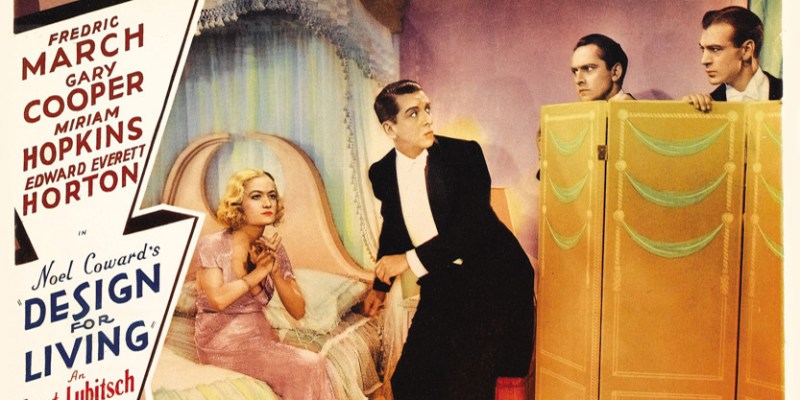“Two’s company, but three’s a couple.” – Adam Phillips, 1996.
And Ernst Lubitsch, 1933. This weekend, the Stanford Theatre serves up one of the most delicious Lubitsch treats: the wholesome threesome comedy “Design for Living” (1933), playing Saturday and Sunday at 4 p.m. and 7:30 p.m.
“Design for Living,” based off a Noël Coward play of the same name, teams up Lubitsch regular Miriam Hopkins (“Trouble in Paradise,” “Smiling Lieutenant”) with Frederic March and Gary Cooper in a welcome break from his tightlipped cowboy schtick. March and Cooper play two Americans in Paris, besties who meet a girl on a train (Hopkins) and fall in love with her. To settle this minor blow to monogamy, Hopkins comes up with a seemingly foolproof “Gentlemen’s Agreement”: As struggling artists, they’ll share the same apartment in Paris — just as friends. They’ll sleep with each other, but they won’t sleep with each other. Will it work?
From its train opening to its final getaway in a cab, the famous “Lubitsch touch” is in full bloom: the fluid costumes, the style for style’s sake, the un-flashily Parisian sets (the simple Paramount Studios touch), the elisions, the performances that leave you awash in a sea of charm (what can’t Miriam Hopkins do?), the morning-after breakfasts, the jewels, the gentle Peeping-Tom-and-Jane camera movements that glide into the characters’ lives and escape without disturbing them, the ability to tell the story by not “telling” it.
Lubitsch based the film off a Noël Coward play celebrated for its droll, dry lines. But Lubitsch proceeded to gut basically all of the play, keeping the basic premise as a structural skeleton on which to build his own wit. Like his silent film version of Oscar Wilde’s “Lady Windermere’s Fan” eight years earlier (where he only used one Wilde line as an intertitle), the critics tore into Lubitsch for destroying the “delicate” wit of Coward’s original and, instead, making a vulgar, naughty, self-indulgent, hedonistic, sexed-up mockery of the traditional American values of monogamy, marriage, public propriety and societal decency. Today, we can safely say it’s not vulgar.
“Design for Living” plays on a double bill with Lubitsch’s 1934 operetta “The Merry Widow,” which plays the same days (Saturday and Sunday) at 5:40 p.m. and 9:10 p.m. Jeanette Macdonald plays a rich widow (she owns 52 percent of the kingdom of Marshovia) who is about to marry a total stranger. To protect the economy, the kingdom’s prince, Maurice Chevalier — Mr. Frenchy-French and “honh-honh-honh” himself — is contracted to woo and marry her. Dave Kehr of the Chicago Reader calls it “the last and finest of the Ernst Lubitsch musicals” whose “genius is most evident in the film’s final poignancy — a farewell to the genre [Lubitsch] helped to create.”
Both films are presented on crisp 35 mm film. Don’t miss them!
Contact Carlos Valladares at cvall96 ‘at’ stanford.edu.
